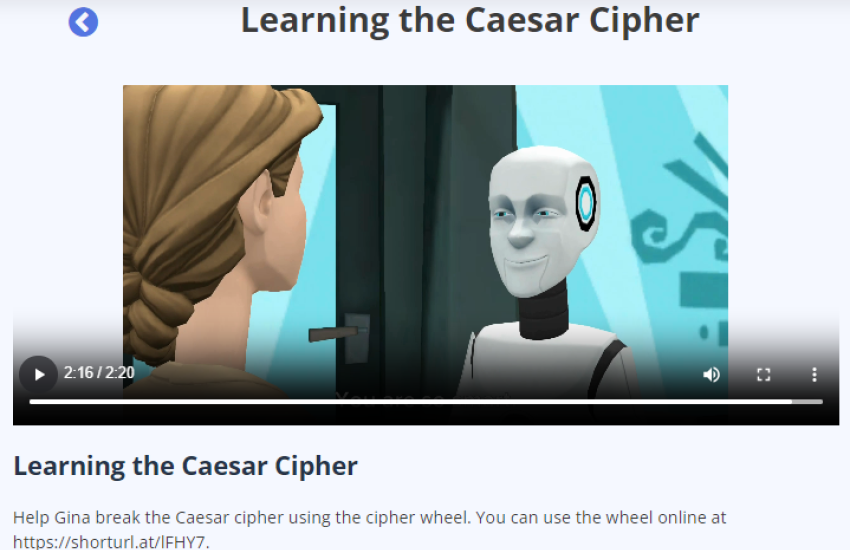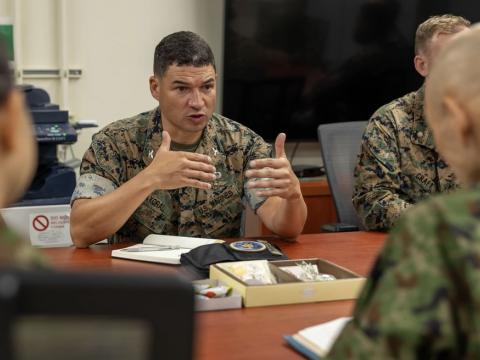Making Cyber Education Fun and Accessible
Game-based learning continues to show promising results among educators and students alike. This is why Virginia Military Institute (VMI) Assistant Professor Sherif Abdelhamid is using a virtual and augmented reality program to bring accessible cyber education to students around the globe.
Abdelhamid also serves as the director of programs at AFCEA International’s Rockbridge Chapter, which launched in April 2022.
With the help of his AFCEA colleagues and members of academia, Abdelhamid aims to make early cyber education a priority.
CryptoQuest is an interactive animation series that teaches cryptography, post-quantum cryptography and cybersecurity through extended reality.
Technology has completely overtaken society on planet Helix, the story tells. “Some hostile forces intend to infiltrate Helix’s inner workings and crash the server that keeps the society running,” Abdelhamid further explained. “These forces have captured the scientist who holds the key to stopping them.”
Gina and Gino, the scientist’s two children who take on a mission to rescue their father by decrypting clues he left behind, also have the help of his robot named Crypto.
“Research shows that extended reality can give more motivation to learn,” he told SIGNAL Media in an interview. Abdelhamid therefore believes in dual-coding theory, which follows the principle of providing students with diverse learning material to avoid solely relying on one sensory type.
“That allows the flow of information not just through one channel but different channels and allows knowledge to be retained more and increase student engagement,” he said.

Not all students have the privilege to work on supercomputers ... so what I did is I made everything available online.
With the use of virtual headsets and computers, students watching the episodes become one with the story as they help the main characters solve mysteries in search of the missing scientists.
This project has been far from a one man show, Abdelhamid emphasized. The collaborative effort included faculty members Blain Patterson, VMI; Sarah Patterson, VMI; Gretchen Matthews, Virginia Tech (VT); and Hiram Lopez, VT.
VMI students Hayden Rose, Rukshana Sarkari, Gabi Woodward and Kolby Quigg also co-authored the work.
Thanks to a grant received from the Commonwealth Cyber Initiative (CCI) in October 2023, all equipment, publications, travel, event attendance and stipends for students and faculty were covered financially .
Abdelhamid, who emigrated to Virginia from Egypt in 2010, received his master’s and Ph.D. in computer science at Virginia Tech. Because of his special interest in education, he then found himself taking additional courses outside the Ph.D. program in engineering education and education in general.
“I realized also that researchers from the education perspective have a different world view than researchers in computer science,” Abdelhamid said. People with an engineering background tend to be inclined to do quantitative research, he explained.
“They see the world as 1 and 0, because computers work as ones and zeros,” he went on. “They only rely on numbers.”

The research was very objective, Abdelhamid recalled, whereas his interest in education taught him that research could also be subjective. This is where the idea for a virtual reality program to teach all things cyber was born.
One of Abdelhamid’s biggest priorities and motivations, however, is providing education to underserved and underrepresented communities. “The main thing behind all of this is accessibility,” he said. “Not all students have the privilege to work on supercomputers.
“What I did is I made everything available online so anyone, anywhere, any student can go and use these tools online,” he stated.
While the CryptoQuest program is currently under testing, other programs are available through VMI and VT websites and can be accessed from around the globe.






Comments